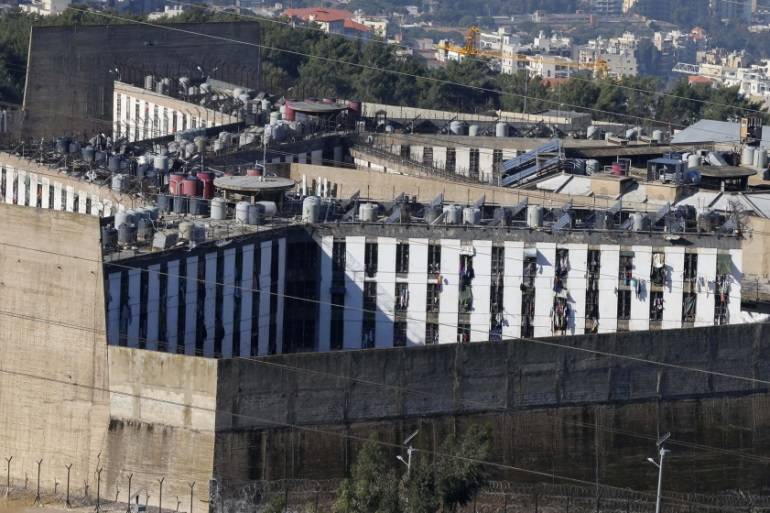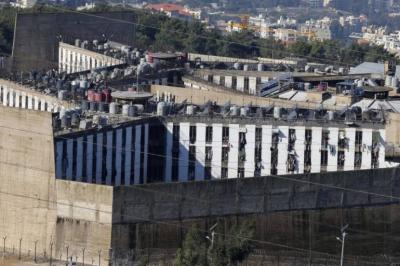Amnesty International has confirmed that Lebanese authorities must urgently prioritize the health of prisoners, as the number of deaths in prisons managed by the Ministry of Interior has doubled in 2022 compared to 2018, the year before the onset of the ongoing acute economic crisis.
The organization stated that "judicial authorities should conduct prompt, impartial, and effective investigations into all cases of death in custody to determine the extent to which misconduct or negligence by prison staff contributed to these deaths and to hold accountable anyone found responsible." The authorities should also investigate the correlation between the sharp increase in deaths and structural factors, such as overcrowding, lack of adequate resources, and impunity for mistreatment, all of which have worsened due to the economic crisis.
Aya Majzoub, Deputy Regional Director for the Middle East and North Africa at Amnesty International, said: "The sharp increase in deaths in custody should be a wake-up call for the Lebanese government that Lebanese prisons need urgent and significant reforms. The government should alleviate overcrowding in prisons," noting that "the economic crisis is not an excuse for prison authorities to deny prisoners access to medication, shift the cost of healthcare onto the families of prisoners, or delay transferring prisoners to hospitals. The judiciary must conduct a swift and impartial investigation into all cases of death in custody and address any shortcomings and negligence on the part of the authorities." According to Majzoub, the Ministry of Interior has provided no explanation for the causes of these deaths in custody. While Amnesty International's investigation found that the noticeable increase in deaths in custody is linked to the economic crisis paralyzing the country, it also recorded shortcomings in the prisons and shortcomings by health authorities in providing timely and adequate medical care to detainees.
Between September 2022 and April 2023, the organization interviewed 16 people, including prisoners and family members of individuals who died in custody. It reviewed several medical reports as well as photos and videos taken by individuals in prison. Amnesty International sent letters to the Ministries of Interior and Health containing questions about deaths in custody. Both ministries sent their responses, which were included in the investigation.
Khalil Talab
While authorities blamed the deterioration in prisoners' health on the economic crisis for at least three deaths in custody that occurred in 2022, families of the deceased informed Amnesty International that prison staff ignored the complaints and symptoms of those detained prior to their deaths, delaying their treatment and transfer to hospitals, leading to a deterioration in their health conditions. According to the organization, Khalil Talab (34 years old) died in Roumieh Prison on August 21, 2022. His brother stated that Khalil's health began to deteriorate upon arriving at the prison. Although his family provided the necessary funds for his treatment, they informed Amnesty International that the prison pharmacy supervisor ignored his pain and that prison guards delayed his transfer to the hospital. His brother said: "He arrived at the hospital already dead or unconscious. Khalil entered prison, and instead of receiving rehabilitation, he met his death."
The organization pointed out that according to the United Nations' "Minnesota" protocol regarding the investigation of potentially unlawful deaths, the prison director must inform an independent judiciary external to the prison’s administration about all deaths in custody, to conduct prompt, impartial, and effective investigations into the circumstances and causes surrounding these deaths.
Overcrowding in Prisons
Overcrowding in prisons has intensified in recent years. Prisons exceed their capacity by 323 percent, with about 80 percent of detainees held in pre-trial detention. A combination of overcrowding and deplorable detention conditions has led to a deterioration in the health of prison inmates. At the same time, the resources necessary to provide healthcare have drastically declined due to the depreciation of the currency and a sharp rise in inflation.
The real value of the Ministry of Interior's budget allocated for providing healthcare to prisoners fell from $7.3 million in 2019 to approximately $628,000 in 2022. As a result, there are not enough staff in prisons, and their pharmacies lack essential medications such as painkillers and antibiotics.
The international organization noted that since the beginning of the economic crisis, the government has failed to pay hospital bills related to the treatment of detainees, leading to many hospitals refusing to accept patients coming from prisons or requiring advanced payment, even in cases requiring emergency treatment, which constitutes a violation of Lebanese law. According to figures that the Ministry of Interior shared with Amnesty International, 846 detainees were hospitalized in 2018, compared to only 107 in 2022.
The international organization urged the Lebanese government, supported by the international community, to allocate additional resources to ensure that prison authorities can improve conditions and the level of healthcare in prisons and other places of detention. The organization has also repeatedly documented the practice of torture and other forms of mistreatment in custody in Lebanon, including the case of a person who died in custody in 2019 amid allegations of torture that were not thoroughly investigated.
The Ministry of Interior informed Amnesty International that 14 members of the Internal Security Forces underwent internal disciplinary procedures for "beating and extorting" some inmates.




